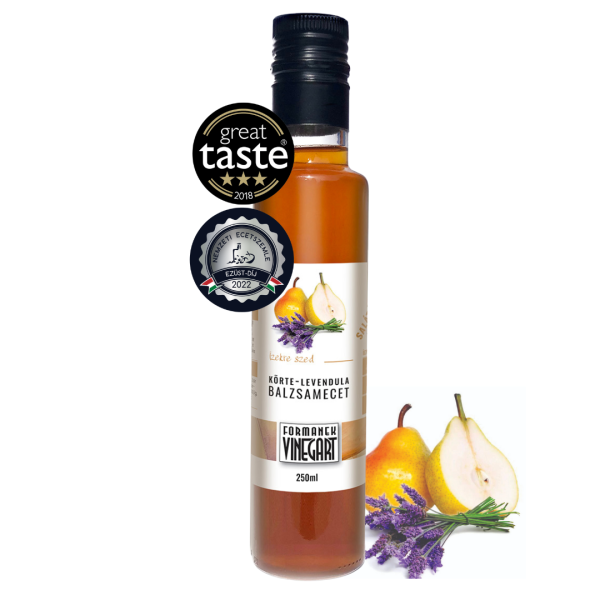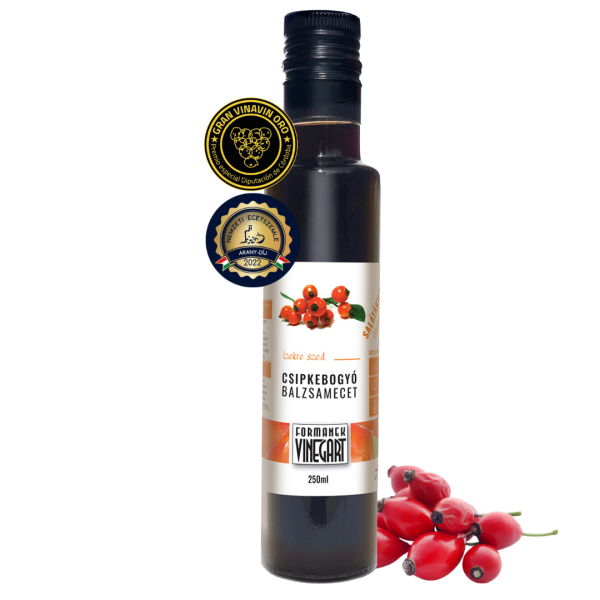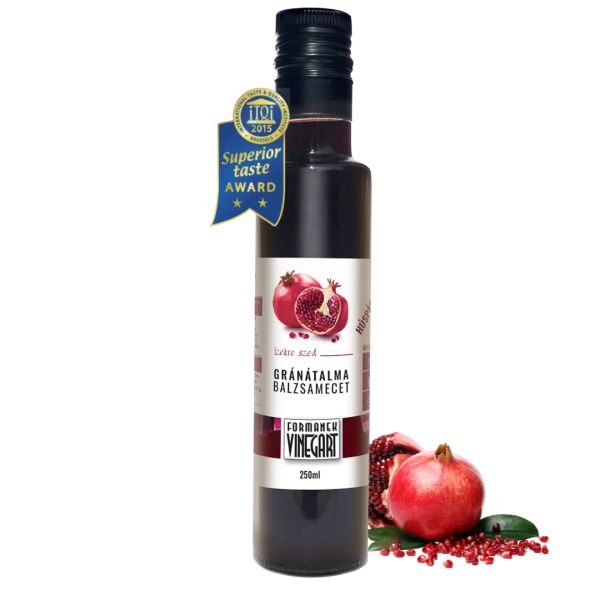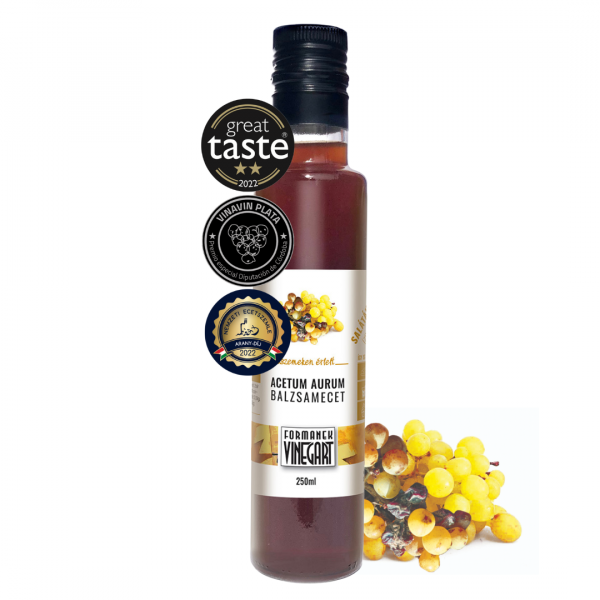Late Harvest Wine Vinegar, 250ml
Furmint wine vinegar aged on fresh, late-harvest grapes.
Producer: Borecet Művek / Tokaj Hegyalja
Product type: Craft vinegar
Acidity: 4.0%
Aging time: 3 month
Volume: 250 ml
Description
The more intense flavor of the grape is echoed in the product, which you can use to spice up your dishes, ragout, or sprinkle it on meat marinades.
$ 128.00
| Title | Range | Discount |
|---|---|---|
| SALE ABOVE | 6 + | 10% |
Benefits of Wine Vinegar
Vinegars are made by fermenting a carbohydrate source into alcohol. Acetobacter bacteria then convert the alcohol into acetic acid, which gives vinegars their strong aromas. Wine vinegar is made by fermenting wine, then straining and bottling it. It’s often aged before bottling to reduce the intensity of the flavor. Many people enjoy using wine vinegar in recipes, though it may also have other household uses.
Nutrition benefits of wine vinegar
1. May lower blood sugar levels
Acetic acid, a main component of vinegar, may help lower blood sugar levels. Red wine vinegar may also reduce the GI of foods.
The acetic acid in wine vinegar and other vinegars may help lower blood sugar levels. It appears to slow your digestion of carbs and increase your absorption of glucose, a type of sugar, resulting in less glucose in your blood.
https://www.ncbi.nlm.nih.gov/pmc/articles/PMC1785201/
https://pubmed.ncbi.nlm.nih.gov/10702577/
https://pubmed.ncbi.nlm.nih.gov/18093343/
https://pubmed.ncbi.nlm.nih.gov/16015276/
One study in adults with insulin resistance found that drinking 2 tablespoons (30 ml) of vinegar before a carb-rich meal lowered blood sugar by 64% and increased insulin sensitivity by 34%, compared to a placebo group.
https://www.ncbi.nlm.nih.gov/pmc/articles/PMC1785201/
https://pubmed.ncbi.nlm.nih.gov/14694010/
In another study, taking 2 tablespoons (30 ml) of wine vinegar at bedtime for 2 days reduced fasting blood sugar levels as much as 6% in people with type 2 diabetes. https://pubmed.ncbi.nlm.nih.gov/17712024/
When used to make certain dishes, wine vinegar can lower these foods’ glycemic index (GI). The GI is a ranking system that scores how much a food raises blood sugar. https://www.ncbi.nlm.nih.gov/pmc/articles/PMC5872791/
One study noted that replacing cucumbers with pickles made with vinegar lowered the GI of a meal by over 30%. Another study demonstrated that adding vinegar or pickled foods made with vinegar to rice lowered the GI of the meal by 20–35%.
https://pubmed.ncbi.nlm.nih.gov/12792658/
https://pubmed.ncbi.nlm.nih.gov/11451723/
2. May protect your skin
The acetic acid and antioxidants in red wine vinegar may be therapeutic for bacterial infections and other skin conditions like burns. Still, more research is needed.
Wine vinegar boasts antioxidants that may fight bacterial infections and skin damage. These are primarily anthocyanins — pigments that give fruits and vegetables their blue, red, and purple colors.
https://www.ncbi.nlm.nih.gov/pmc/articles/PMC2582525/
https://www.ncbi.nlm.nih.gov/pmc/articles/PMC5613902/
A test-tube study determined that the anthocyanin content of wine vinegar depends on the type and quality of wine used to make it.
https://www.sciencedirect.com/science/article/abs/pii/S0963996910000840
Wine vinegar also contains resveratrol, an antioxidant that may fight skin cancer, such as melanoma.
https://pubmed.ncbi.nlm.nih.gov/28780124/
https://www.ncbi.nlm.nih.gov/pmc/articles/PMC6089775/
For example, one test-tube study found that resveratrol killed skin cancer cells and significantly slowed new cancer cell growth.
https://pubmed.ncbi.nlm.nih.gov/30588012/
Additionally, the acetic acid in wine vinegar may fight skin infections. In fact, acetic acid has been used medicinally for over 6,000 years to treat wounds and chest, ear, and urinary tract infections.
https://pubmed.ncbi.nlm.nih.gov/19286325/
https://www.ncbi.nlm.nih.gov/pmc/articles/PMC4566994/
In one test-tube study, acetic acid prevented the growth of bacteria, such as Acinetobacter baumannii, that commonly cause infections in burn patients. https://www.ncbi.nlm.nih.gov/pmc/articles/PMC4566994/
Any type of vinegar should be diluted with water before being applied to your skin to reduce its acidity, as undiluted vinegar can cause significant irritation or even burns.
https://www.ncbi.nlm.nih.gov/pmc/articles/PMC4479370/
3. May aid weight loss
Wine vinegar may support weight loss by increasing feelings of fullness and delaying the release of hunger hormones.
The acetic acid in wine vinegar may support weight loss. Acetic acid has been shown to reduce fat storage, increase fat burning, and reduce appetite.
https://www.ncbi.nlm.nih.gov/pmc/articles/PMC5532206/
https://pubmed.ncbi.nlm.nih.gov/19469536/
https://pubmed.ncbi.nlm.nih.gov/24781306/
https://pubmed.ncbi.nlm.nih.gov/26176799/
What’s more, it keeps food in your stomach longer. This delays the release of ghrelin, a hunger hormone, which may prevent overeating.
https://pubmed.ncbi.nlm.nih.gov/18093343/
In one study, obese adults drank a 17-ounce (500-ml) beverage with 15 ml, 30 ml, or 0 ml of vinegar daily. After 12 weeks, the vinegar groups had significantly lower weights and less belly fat than the control group.
https://pubmed.ncbi.nlm.nih.gov/19661687/
In another study in 12 people, those who consumed vinegar with higher amounts of acetic acid alongside their breakfast of white-wheat bread reported increased fullness compared to those who consumed low-acetic vinegar. https://pubmed.ncbi.nlm.nih.gov/16015276/
4. Contains powerful antioxidants
Wine vinegar packs powerful antioxidants known to help prevent chronic diseases.
Wine, the primary ingredient in wine vinegar, boasts powerful polyphenol antioxidants, including resveratrol. Wine also contains antioxidant pigments called anthocyanins. https://pubmed.ncbi.nlm.nih.gov/10640265/.
Antioxidants prevent cellular damage caused by molecules known as free radicals, which can otherwise lead to chronic illnesses like cancer, diabetes, and heart disease. https://www.ncbi.nlm.nih.gov/pmc/articles/PMC4310837/.
5. May boost heart health
The acetic acid and polyphenols in wine vinegar may help lower total cholesterol, blood pressure, and triglycerides, high levels of which may be risk factors for heart disease.
Wine vinegar may improve your heart health. Its acetic acid and resveratrol may help prevent blood clots and lower cholesterol, inflammation, and blood pressure. https://pubmed.ncbi.nlm.nih.gov/24811350/, https://pubmed.ncbi.nlm.nih.gov/28751642/
A 4-week study in 60 adults with high blood pressure found that taking wine extract significantly lowered blood pressure compared to grape extract, which had no effect. https://pubmed.ncbi.nlm.nih.gov/25942487/.
Polyphenols like resveratrol in wine vinegar relax your blood vessels and increase the amount of calcium in your cells, which improves circulation and lowers blood pressure
https://www.ncbi.nlm.nih.gov/pmc/articles/PMC6165230/
https://www.ncbi.nlm.nih.gov/pmc/articles/PMC1785201/
https://pubmed.ncbi.nlm.nih.gov/11826965/
https://pubmed.ncbi.nlm.nih.gov/15306214/
Acetic acid may have similar effects. Rodent studies indicate that acetic acid lowers blood pressure by increasing calcium absorption and altering hormones that control blood pressure, as well as fluid and electrolyte balance https://www.ncbi.nlm.nih.gov/pmc/articles/PMC1785201/
One study revealed that rats fed acetic acid or vinegar experienced a significant reduction in blood pressure compared to rats fed only water https://www.ncbi.nlm.nih.gov/pmc/articles/PMC1785201/ ,
https://pubmed.ncbi.nlm.nih.gov/11826965/
Furthermore, both acetic acid and resveratrol may lower triglycerides and cholesterol, high levels of which are potential risk factors for heart disease https://pubmed.ncbi.nlm.nih.gov/18706279/,
https://www.ncbi.nlm.nih.gov/pmc/articles/PMC6220545/
Acetic acid has been shown to lower total cholesterol and triglycerides in rats. High doses also lowered LDL (bad) cholesterol in rabbits fed a high-cholesterol diet https://pubmed.ncbi.nlm.nih.gov/16611381/,
https://www.ncbi.nlm.nih.gov/pmc/articles/PMC2837006/.
6. Incredibly versatile
Wine vinegar is most often used in salad dressings and marinades for meat and vegetable dishes. That said, it can also be used for personal care.
Wine vinegar is widely used in cooking but may have other applications as well. It’s often an ingredient in salad dressings, marinades, and reductions. Red wine vinegar pairs well with hearty foods like pork, beef, and vegetables. While white vinegar is often reserved for household cleaning, wine vinegar may be used for personal care. For example, you can dilute wine vinegar with water in a 1:2 ratio and use it as a facial toner. Additionally, adding 2–3 tablespoons (30–45 ml) of wine vinegar to your bath along with sea salt and lavender may soothe your skin. Some people also find that diluted wine vinegar helps heal mild sunburn.
Overconsumption can have adverse effects
Daily consumption over several years has been shown to increase your risk of negative effects https://pubmed.ncbi.nlm.nih.gov/26115563/.
For example, drinking too much vinegar can worsen digestive symptoms, such as nausea, indigestion, and heartburn. It may also affect certain blood pressure and heart medications by lowering potassium levels, which can further reduce blood pressure https://pubmed.ncbi.nlm.nih.gov/26115563/, https://pubmed.ncbi.nlm.nih.gov/23979220/.
Additionally, acidic solutions like vinegar may damage tooth enamel, so be sure to rinse your mouth with water after enjoying vinegar-containing foods or beverages https://pubmed.ncbi.nlm.nih.gov/25571718/, https://pubmed.ncbi.nlm.nih.gov/16167607/.




